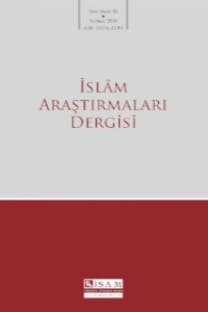İslâm Düşünce Geleneğinde Naklî İlim Kavramı ve İbn Haldûn
İslâm düşünce geleneğinde ilim kavramına ve ilimler tasnifine ilişkin değerlendirmelerde genellikle naklî/şer‘î-aklî/vaz‘î, dinî-aklî, Arabî-Acemî şeklinde ikili bir ilim sınıflandırması yaygın kabul görmektedir. Birincisi tefsir, hadis, fıkıh, kelâm gibi İslâmî/şer‘î ilimler adı verilen disiplinleri kapsarken ikincisi ise genellikle antik felsefe mirası çerçevesinde yer alan metafizik, fizik, mantık ve matematik gibi bilimleri kapsamaktadır.
Anahtar Kelimeler:
İbn Haldûn, Mukaddime, bilgi, ilimler tasnifi, temel İslam bilimleri
Ibn Khaldun and the Concept of Traditional Knowledge in the Islamic Intellectual History
This study examines the concept of knowledge proposed by Ibn Khaldun in his Muqaddimah and particularly what he called the fundamental Islamic sciences. The study places Ibn Khaldun’s understanding within the broader Islamic historical framework through studying the history of the classification of knowledge up to Ibn Khaldun. While evaluating these sciences, the method developed by Ibn Khaldun shall be given special emphasis, and the question of how faithful he remained to those sciences that he perceived as being concrete shall be examined in these sections. This work investigates in what way Ibn Khaldun’s methods of studying the history of civilizations can contribute to the modern Islamic thought and the concept of Islamic sciences. In a more abstract way, one of the aims of this study is to explore whether Ibn Khaldun’s approach can offer a perspective to modern Muslims who are studying the history of fundamental Islamic sciences.
Keywords:
Ibn Khaldun, Muqaddimah, Knowledge, Classification of Sciences, Fundamental Sciences of Islam,
___
- Fârâbî, Kitâbü’t-Tenbîh alâ sebîli’s-saâde (nşr. Ca‘fer Âl-i Yâsîn), Beyrut: Dârü’l-menâhil, 1405/1985.
- ISSN: 1301-3289
- Yayın Aralığı: Yılda 2 Sayı
- Başlangıç: 1997
- Yayıncı: TDV İslâm Araştırmaları Merkezi
Sayıdaki Diğer Makaleler
İbn Arabi: Kibrit-i Ahmer'in Peşinde
İbn Arabi: Kibrit-i Ahmer'in Peşinde
İbn Haldûn’un “es-Siyâsetü’l-medeniyye” Teorisini Eleştirisi
İbn Haldûn’un Osmanlı Düşüncesine Etkisi
İbn Haldûn’un Sûfîlere ve Tasavvufa Bakışı: Umranda Tasavvuf İlmi
İbn Haldûn’un Asabiyet Kavramı: Siyaset Teorisinde Yeni Bir Açılım
